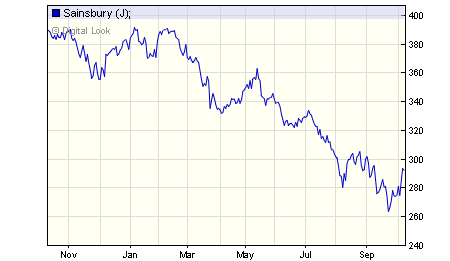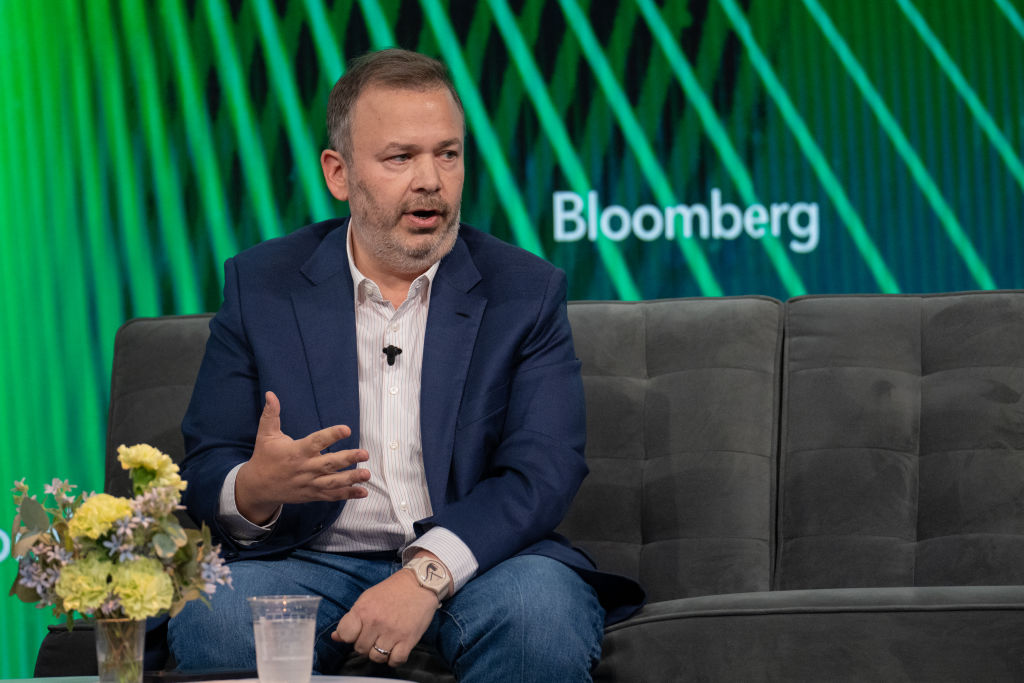This stock may be the best bargain on the market
Food retailing is a classic defensive sector. But not all retailers are equal. Bengt Saelensminde looks at two companies, and explains why one is on the way out, and the other is the best value stock on the market.
Get the latest financial news, insights and expert analysis from our award-winning MoneyWeek team, to help you understand what really matters when it comes to your finances.
You are now subscribed
Your newsletter sign-up was successful
Want to add more newsletters?

Twice daily
MoneyWeek
Get the latest financial news, insights and expert analysis from our award-winning MoneyWeek team, to help you understand what really matters when it comes to your finances.

Four times a week
Look After My Bills
Sign up to our free money-saving newsletter, filled with the latest news and expert advice to help you find the best tips and deals for managing your bills. Start saving today!
On Friday, Premier Foods, the country's largest food manufacturer, released a devastating profits warning. Sales have slumped this year, said chief executive Michael Clarke. And the company is going to fall a long way short of its profit targets.
That spooked the City. Shares in Premier, not so long ago trading around £2.50, were smashed down to under 5p. And many are now questioning whether this blue chip company can even survive.
How has the owner of iconic brands from Hovis to Paxo and Mr Kipling got itself into a life-threatening position?
MoneyWeek
Subscribe to MoneyWeek today and get your first six magazine issues absolutely FREE

Sign up to Money Morning
Don't miss the latest investment and personal finances news, market analysis, plus money-saving tips with our free twice-daily newsletter
Don't miss the latest investment and personal finances news, market analysis, plus money-saving tips with our free twice-daily newsletter
That's what I want to talk about today. Because while Premier Foods suffers, other companies in the food industry are prospering.
Today I'd like to recommend a food stock with great prospects for the year ahead. This company pays a 5.1% dividend (that's twice covered). And it has a balance sheet that most UK blue chips can only dream of.
How long has Premier got?
The most important consideration for any business heading into this downturn is going to be the strength of its balance sheet.
During normal downturns businesses can usually borrow enough money to see them through. But as Mervyn King pointed out last week, "This is the most serious financial crisis we've seen at least since the 1930s, if not ever".
We really can't go on looking at stocks in the same way we did before the financial crisis hit. Take Premier Foods
After Friday's shock news, analysts are now pencilling in profits of about £200m for Premier. As I write, the shares are trading at 6p, which means the business is worth about £139m. So, they're trading at much less than one times earnings incredible!?
So, should you rush out and buy the stock?
Not without looking at the balance sheet you shouldn't!
Part of the problem is debt. Successive management teams have spent years buying up businesses to create a massive stable of brands. In 2007 (just before the big crunch), they paid £1.2bn for Rank Hovis McDougall. Their shopping spree culminated with a debt position of £1.8bn at its worst point.
Recently management has been offloading units such as Quorn (the meat free business) and its canning business in a desperate attempt to pay down creditors.
It now looks like Premier will be £900m in the red come the year-end. But then of course there's the pension. That's another £500m it owes!
So now it is desperately scrambling to find more stuff to sell. How long has it got to get out of trouble? Well, it's got a massive debt facility that matures in December 2013.
That leaves it with three options. It can renegotiate this debt before December 2013. It can try and find someone else who'll give it a fresh loan. Or else it can use the next couple of years to sell off any brands of value and try to trade its way out of this mess.
I don't think any of those are likely. But even if they were, Premier's problems go beyond payings its debts.
The brands are on the wane
Premier is the UK's largest food manufacturer and holds around 60 well-known brands. It's got all the household names that I'm sure most of us grew up with. Mother's Pride, Sun Pat peanut butter, Mr Kipling, Angel Delight, Paxo, Bisto and even the classic Golden Shred marmalade.
And as we saw last week, food is supposed to be a classic 'defensive' industry. I mean, people will always need sustenance no matter what the economic climate. And over the years popular brands have proved remarkably resilient during downturns.
But things are changing in the retailing environment. Many of Premier's brands are starting to look outdated. "Do people still buy that stuff?" said Mrs S, as she peered over my shoulderat the weekend.
So serious is the problem that the new chief exec Michael Clarke is prepared to dump all but eight of what he calls his 'power brands'. The 'for sale' sign has gone up on 52 has-beens. But it looks like their value is waning.
The biggest threat is the supermarket own-brands. The big supermarkets have got the resources to invest in own-label products to keep up with consumer preferences. And they're doing it at every level on the basic, mid-range and even premium lines.
And that's why I believe supermarkets are your best defence in this industry. And as far as I'm concerned, one stock in particular stands out.
Sainsbury's time has come
Last week both Sainsbury (SBRY) and Tesco released half-year results. I've always been a big fan of Tesco even Warren Buffett has been picking up shares recently. It's got a great international business, particularly in Asia. And it's thanks to the international side that sales continued to grow strongly despite weakness in the UK.
But if this downturn morphs into something even more serious, then I think a growth stock like Tesco is likely to suffer.
For a pure defensive, I prefer the look of SBRY. Figures out last week show that in the UK, like for like sales grew 1.9% (Tesco actually fell) as the firm homed in on growing its own-brands.
But it's not just a strong business I'm looking for in these straitened times. It's a strong balance sheet I want to see. And for SBRY that comes in the way of its massive property portfolio. It tells us its properties are worth some £10.5bn which puts its net debt of £1.8bn firmly into perspective.
This financial strength means SBRY can pay you a dividend of around 5.1%, nearly twice covered (ie technically it could pay you nearly twice the dividend out of current profits).
There are precious few retailing stocks that will prove to be truly defensive. But the supermarkets are a sub-sector that's looking good. And for me, SBRY looks incredibly enticing it looks far far too cheap at these levels. In fact, I think this is the best bargain in the market right now.
Of course there are risks with any stock. SBRY has just announced that it's joining the 'supermarket price wars'. And price wars are rarely good for the industry as a whole.
And SBRY isn't immune from pension funds trouble. As a big employer, they have a deficit to deal with too. But at least they can afford to do so!
Last but certainly not least, SBRY will likely follow the market down if the FTSE takes another tumble. And I'm certainly not ruling that out.

Ticker: SBRY.L
Price: 295.6p
52 Week High/Low: 395.7p/258p
Market Cap: 5549.24m
Dividend Yield: 5.1%
Five-year performance: 2006 +29.82% | 2007 +3.91% | 2008 -22.75% | 2009 -1.52% | 2010 +16.32% | 2011 (to 7 October) -23.88%
This article is taken from the free investment email The Right side. Sign up to The Right Side here.
Important Information
Your capital is at risk when you invest in shares - you can lose some or all of your money, so never risk more than you can afford to lose. Always seek personal advice if you are unsure about the suitability of any investment. Past performance and forecasts are not reliable indicators of future results. Commissions, fees and other charges can reduce returns from investments. Profits from share dealing are a form of income and subject to taxation. Tax treatment depends on individual circumstances and may be subject to change in the future. Please note that there will be no follow up to recommendations in The Right Side.
Managing Editor: Frank Hemsley. The Right Side is issued by MoneyWeek Ltd.
MoneyWeek Ltd is authorised and regulated by the Financial Services Authority. FSA No 509798. https://www.fsa.gov.uk/register/home.do
Get the latest financial news, insights and expert analysis from our award-winning MoneyWeek team, to help you understand what really matters when it comes to your finances.
Bengt graduated from Reading University in 1994 and followed up with a master's degree in business economics.
He started stock market investing at the age of 13, and this eventually led to a job in the City of London in 1995. He started on a bond desk at Cantor Fitzgerald and ended up running a desk at stockbroker's Cazenove.
Bengt left the City in 2000 to start up his own import and beauty products business which he still runs today.
-
 The ‘mirror will’ flaw which could mean your savings end up with strangers – how to protect your legacy
The ‘mirror will’ flaw which could mean your savings end up with strangers – how to protect your legacyWriting a will lets you pass your wealth onto your loved ones. But couples with a so-called ‘mirror will’ could unintentionally leave their family exposed to being cut out.
-
 Saba comes for Edinburgh Worldwide’s board... again
Saba comes for Edinburgh Worldwide’s board... againSaba Capital Management has announced fresh plans to displace the board of Edinburgh Worldwide despite having been decisively beaten in a recent vote